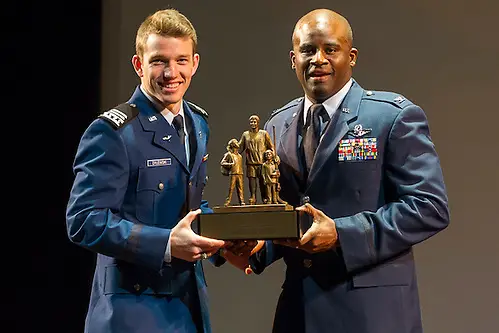
TAMPA, Fla. — The demands on any student-athlete’s time are daunting. Some struggle with the balancing act between the classroom and energy-draining practices, weight room sessions, games and road trips. Student-athletes at service academies face the additional layer of their military demands.
Then you have an individual like Air Force goaltender Chris Dylewski, who adds an almost encyclopedic list of community service and leadership accomplishments. It’s no wonder he’s this year’s recipient of the Hockey Humanitarian Award, presented by BNY Mellon Wealth Management.
[scg_html_ff2016]”All the kids that go to the Air Force are extraordinary; this guy is extra-extraordinary,” Air Force hockey coach Frank Serratore says. “We never nominated a guy for the Humanitarian Award before because we didn’t think we had one who was qualified.
“These kids just don’t have a lot of time. Their responsibilities academically, militarily and athletically … there aren’t enough hours in the day to do what’s required by the Academy, let alone do things outside of the Academy.
“That’s what makes this kid extra-extraordinary. I don’t know how he does it.”
A double major in international history and political science, Dylewski held the highest possible military rank and position in each of his first three cadet years, including a stint as Cadet Wing Command Chief, where he was directly responsible for 3,000 of his fellow officer candidates.
This year, he took on the role of Squadron Character Officer, where he oversees all of the community service and character development activities of a 100-person cadet squadron.
Then there’s a list of humanitarian achievements that boggles the mind. Dylewski formed RISE, a nonprofit organization designed to develop leadership skills in young people seeking to serve their communities. He created Operation Safe, an umbrella organization focused on genocide and mass atrocities awareness along with a fellow cadet’s Unchained program to combat sex trafficking and provide basic necessities to its victims.
He’s assisted the Wounded Warrior sled hockey team. When a freshman cadet committed suicide, Dylewski founded a program that produces an annual Guide to Cadet Life for freshmen to help them adjust to
Academy life.
And that’s just the start. Dylewski has led or volunteered for more community outreach programs than can be reasonably listed, not to mention serving as chief editor of the school’s literary journal.
How does he do it?
“The things I get to do are almost universally things I love to do,” he says. “So it’s not I’m like grinding through a day from one thing I hate to another and being miserable. It’s about being excited about every step.
“I’m always tired, but I’m excited enough about what I do to get through that.”
A glimpse into a typical cadet’s day illustrates the challenges, which as a senior also includes a half-hour commute from off-base housing.
“I wake up at 5, stumble out of bed and maybe eat something,” Dylewski says. “I get over to base and am in uniform and ready for duty at 6:45, which is our morning Accountability Formation. The first class is at 7:30 and I’m in class until 11:30. We march in formation after class before our mandatory lunch.
“Then it’s back to class for another hour. After that, if I’m lucky I might have 15-20 minutes to meet with a teacher.
“Then I’ll go down to the rink and probably use the Human Performance Lab for hand-to-eye coordination work, go to the locker room for a team meeting and be on the ice and skate for an hour or an hour and a half. Then we run down to the gym until it closes. We’re the last ones in there; we leave when they close the doors.
“At that point it’s probably 7, so we run back to the locker room, shower and change. Then it’s dinner and homework.
“When I have a tough course load, such as when I switched majors and had to take 27 credit hours, I could have four or five hours a night of homework, so the math of getting sleep gets kind of hairy.”
All of that doesn’t add up to having time for any humanitarian efforts, much less all of the ones Dylewski has pursued.
“There’s the offseason and we have off days,” he explains matter-of-factly. “And there’s time on the weekend.”
The drive to do more than just hang out has been there for as long as he remembers.
“I’ve always been stir crazy and looked for other things to do,” Dylewski says. “When I was a young kid, I never wanted to sleep. It drove me nuts. It was such a waste of time when I could do other things.
“Now I love to sleep and wish I had a lot more of it, but I always had that need to be doing things.”
That urge directed itself to serving others in part because of his first glimpse of abject poverty at the age of 14 on a mission to build a house in Juarez, Mexico. It left a lasting impression.
“It was a revelation to me because I’d always been brought up on Air Force bases,” he says. “This was real poverty. Dirt, tin sheds and mangy dogs.”
Some of that drive to serve others also came from his father, a two-star general, and even more so from his mother.
“She understands what it means to commit yourself to people,” Dylewski says. “She’s devoted at a level that’s hard to capture.”
It’s all added up to an extraordinary individual. Arguably, the only area where Dylewski has fallen at all short is in a game-day role for the Falcons hockey team, but although he’s only managed a few minutes between the Air Force pipes, he’s still had a significant impact.
“He is Mr. Selfless,” Serratore says. “His role on the team is all about others. He made us better Monday through Thursday.
“When one goalie transferred and we had to bring in two freshmen, I told Chris that I needed him to mentor them. He said, ‘I’m all in.'”
That mentoring proved to be a wild success as one of those two freshmen, Shane Starrett, earned first-team All-Atlantic Hockey honors in his rookie year.
Of course, Dylewski would have loved to be a collegiate star athlete. But if he’d been required to give up his humanitarian work to achieve athletic stardom — be a Hobey Baker Award candidate as opposed to a Humanitarian Award candidate, if you will — he’d have respectfully declined.
“That wouldn’t be fulfilling for me,” he says. “That wouldn’t be a good trade in my book.”
A bright future awaits Dylewski. He’s deferring his Air Force service for two years to pursue a master’s degree in public policy at the Harvard Kennedy School.
“I’ll be taking classes that focus on what the character of great American leadership looks like and what not-so-great American leadership looks like,” he says. “I’m going to focus on how I can be the former and avoid the latter and really drive change in my service to the nation and the communities that I’ll be part of.
“It’ll be a force multiplier, to use a military term.”
And to those who choose to focus only on their own careers and do none of the humanitarian work that makes up such a core part of Dylewski’s life, he makes no pronouncement of superiority.
“I wouldn’t judge that approach,” he says. “There are lots of people who focus on their careers and then later in life have awesome resources to then make differences in peoples’ lives.
“I can think of a ton of examples of people who became really successful and then used that success to benefit others. That’s great.
“I would say to folks who are looking exclusively at success that it is really gratifying, I’m sure, until you try service to others. There’s a special something that you get out of service that you don’t get out of other pursuits.
“Once you put something into it, even in a little way, you’re going to want more.”


